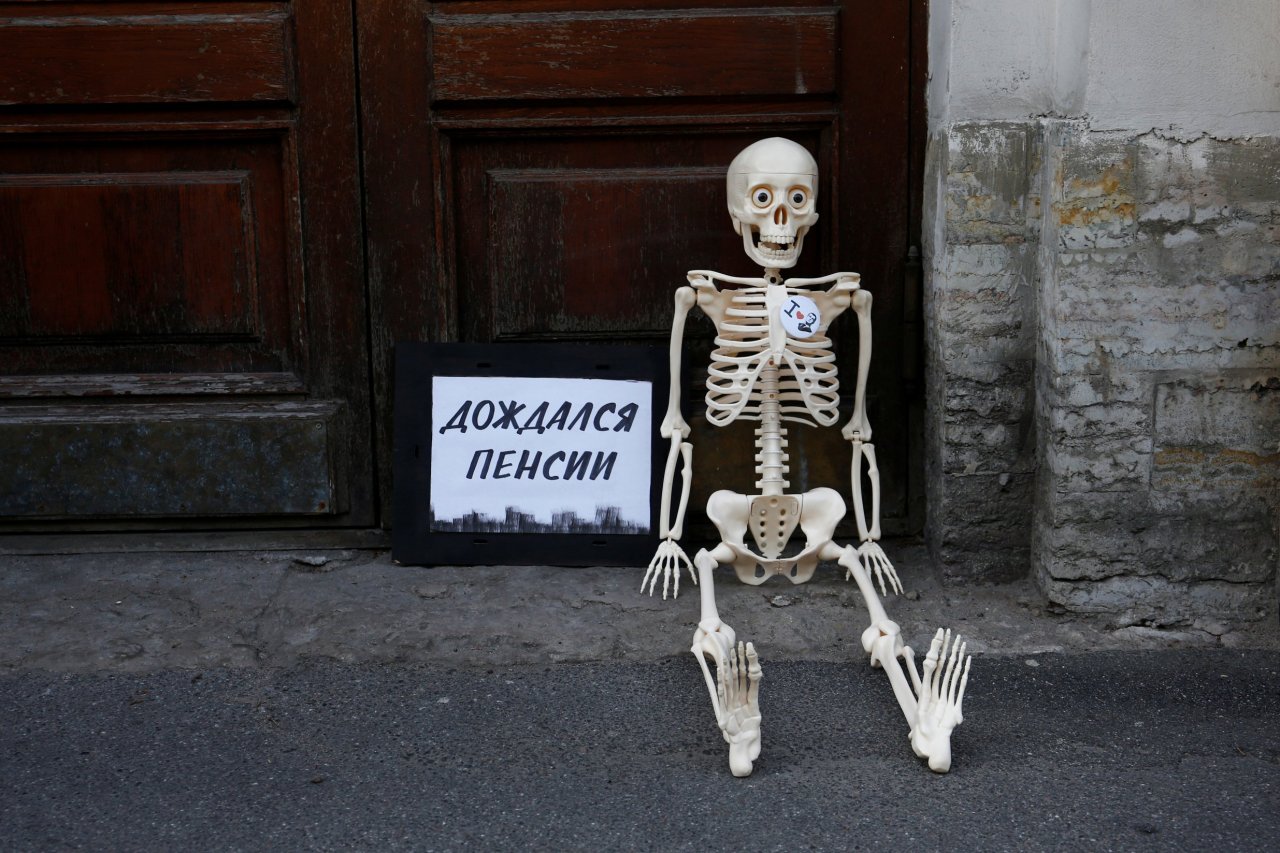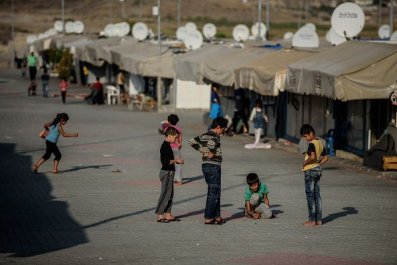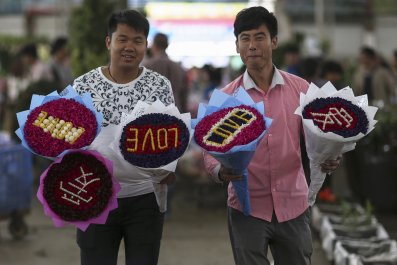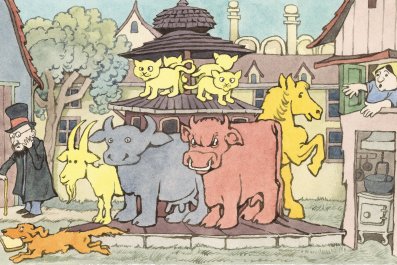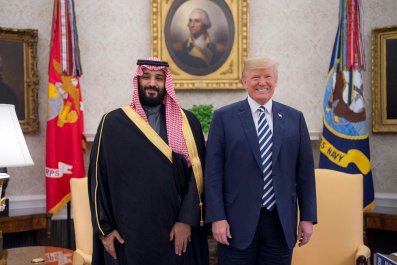In the fall of 2005, Vladimir Putin, in his second term as Russia's president, was holding a televised Q&A session with the nation. Toward the end of the program, a middle-aged woman asked him to comment on media reports that the government wanted to increase the age at which Russian citizens can retire and claim—as almost all of them do—a state pension.
The question was an important one for Putin, whose popularity after he came to power in 2000 was partly due to his success in ensuring that senior citizens received their pensions in full and on time, something that had rarely happened under his predecessor, President Boris Yeltsin.
Putin stared directly into the camera. "I am opposed to raising the retirement age," he said, wagging his index finger to emphasize his words. "And as long as I am president, no such decision will be taken."
Thirteen years on, Putin is still president, but his promise to the Russian people has come back to haunt him. On June 14, his ruling United Russia party introduced legislation to increase the state pension age—currently one of the lowest in the world—from 60 to 65 for men and from 55 to 63 for women. The increase will be phased in gradually over a number of years. Retirement ages for some professions, including soldiers and police officers, will remain unaltered. Even so, the backlash to the proposed changes has resulted in the biggest blow to Putin's popularity yet. The president—who enjoyed overwhelming domestic popularity as Russia created increasingly hostile relations with the West—appears to have no clear return from this decline.
The pension age raise represents the first adjustment to retirement ages that were established under Soviet dictator Joseph Stalin in the early 1930s. Although government advisers had long urged the Kremlin to alter the country's pension system, saying it was not economically viable in the long term, a series of Soviet and Russian leaders had balked at carrying out reforms over concerns of a public backlash. While current state pensions are hardly generous, averaging just 13,342 rubles ($213) a month, they are a lifeline for millions of Russians without relatives able to support them financially.
Adding to the controversy, the government's plans were announced on the opening day of the 2018 World Cup, while most of the country was concentrating on the national soccer team's first game, and triggering allegations that the government was trying to bury bad news.
If that was the case, the ploy was a failure: The measures sparked widespread anger and nationwide protests, and Putin's seemingly ironclad popularity, which has survived allegations of multibillion-dollar corruption and deteriorating living standards in recent years, took a beating. In just two weeks, the president's approval ratings fell from 77 percent to 63 percent, according to the Russian Public Opinion Research Center, the state-run pollster.
Those figures may still be high compared with average approval ratings for Western leaders, but analysts say they represent a worrying decline for Putin, who boasts total control over state media. They are also the Kremlin strongman's lowest since shortly before Russia annexed Crimea from Ukraine in 2014, after which Putin's popularity rocketed to sky-high levels amid a standoff with Western countries.
The proposed reforms are unpopular for a number of reasons, but mainly because many Russians worry that they simply won't live long enough to receive their pensions. While life expectancies are rising in Russia, the one for men is just 66, and one out of every 10 men will not live to see their 65th birthday, according to the Confederation of Labor of Russia, a labor union alliance opposed to the pension increase. "I don't want to die at work," read a sign held up by a protester at a recent demonstration in Moscow. Although Russian women can expect to live to 73, widespread age discrimination means their employment opportunities are extremely limited once they reach middle age, and some worry the government's plans mean they could be left without a pension or a job. "I really fear for my future, if the government puts up the retirement age," says Yulia Korzina, a 40-year-old single mother in Moscow.
The Kremlin admits that Putin went back on his pledge never to increase pensions, but says changing demographics left him with no choice. The population is rapidly aging and by 2044 the numbers of senior citizens could approach the number of people in work, according to government forecasts, putting massive pressure on the national budget. "No country exists in a vacuum," says Dmitry Peskov, the Kremlin spokesman. Dmitry Medvedev, the prime minister, says the reforms are "unavoidable and long overdue."
It wasn't until July 20, over a month after the government's plans were announced, that Putin finally commented on the proposed pension reforms, saying that he didn't like them, but offering no indication that they would be scrapped. "This is, of course, a sensitive issue for the majority of our citizens," he said. "But [our decision] should not be based on emotions."
But Russians are unconvinced. Public opinion surveys by the Levada Center, an independent pollster based in Moscow, indicate that around 90 percent of voters are against the government's plans, while 40 percent are ready to take to the streets to force the government into a U-turn. "This shows the presence of serious anger and tension in society," says Lev Gudkov, the head of the Levada Center.
And there are signs that that anger could be about to boil over. On August 3, a bomb went off outside the offices of the National Pension Fund office in Kaluga, a city in western Russia, partly destroying the building entrance. State media did not report on the blast, and news about it was later removed from the website and social media page of the regional broadcaster that reported it.
Tens of thousands of people across Russia, including Communist Party supporters, labor union members, and pro-democracy activists, have so far rallied to protest the pension reforms. Analysts predict the size of the demonstrations will grow in the fall, when Russians traditionally return from vacations and visits to their dachas, or summer cottages. Alexei Navalny, a prominent Kremlin critic, is urging more nationwide protests against the government's plans on September 9, the day when Russians vote in elections for regional parliaments, as well as for Moscow's mayor. "Raising the pension age is a genuine crime. It's a simply the robbery of tens of millions of people masquerading as a necessary reform," Navalny says.
The Kremlin is so concerned about street protests over the pension issue that it has asked officials to monitor the public mood, Russia's Vedomosti business newspaper reported recently, citing sources close to the presidential administration.
Despite the outcry, Russia's parliament gave its first-reading approval to the legislation on July 19. (Dates for further readings have yet to be set, but it will hold a meeting on the matter Tuesday.) Discontent over the reforms within party ranks meant, however, that United Russia had to order its lawmakers to vote for the controversial policy. Even so, there were dissenters. Natalia Poklonskaya, a well-known United Russia lawmaker, defied instructions and voted against the legislation, while another eight lawmakers from the ruling party failed to show up for the vote.
Increasing numbers of United Russia councilors and party members are also expressing their opposition to the government's plans. "The party's program and the activity of its leadership are now directed against their own nation," says Nikolai Tarakhov, a former United Russia member who quit the party in protest at the planned pension reforms. Media reports say Putin and Medvedev, the prime minister, are so unpopular right now that United Russia officials have been instructed not to use their images in vote-canvassing campaigns ahead of next month's regional elections.
Abbas Gallyamov, a former Kremlin speechwriter turned political analyst, says even if Putin halts the pension reforms and dismisses the government, voters are likely to interpret this as a "forced retreat." And that, he says, could deal a fatal blow to the president's image as an infallible strongman leader: "There is no guaranteed way to save Putin's popularity now."



